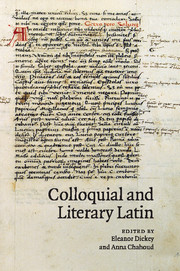Book contents
- Frontmatter
- Contents
- List of contributors
- Acknowledgements
- Foreword (David Langslow)
- PART I THEORETICAL FRAMEWORK
- 1 Introduction
- 2 Colloquial language in linguistic studies
- 3 Roman authors on colloquial language
- 4 Idiom(s) and literariness in classical literary criticism
- 5 Preliminary conclusions
- PART II EARLY LATIN
- PART III CLASSICAL LATIN
- PART IV EARLY PRINCIPATE
- PART V LATE LATIN
- Abbreviations
- References
- Subject index
- Index verborum
- Index locorum
2 - Colloquial language in linguistic studies
Published online by Cambridge University Press: 04 April 2011
- Frontmatter
- Contents
- List of contributors
- Acknowledgements
- Foreword (David Langslow)
- PART I THEORETICAL FRAMEWORK
- 1 Introduction
- 2 Colloquial language in linguistic studies
- 3 Roman authors on colloquial language
- 4 Idiom(s) and literariness in classical literary criticism
- 5 Preliminary conclusions
- PART II EARLY LATIN
- PART III CLASSICAL LATIN
- PART IV EARLY PRINCIPATE
- PART V LATE LATIN
- Abbreviations
- References
- Subject index
- Index verborum
- Index locorum
Summary
The term colloquial has had a varied fortune in the history of linguistics. In works written in the nineteenth and the first half of the twentieth centuries it is possible to find references to the colloquial form of language, sometimes contrasted on the one hand with ‘formal’ or ‘literary’ language, and on the other hand with ‘vulgar’ or ‘illiterate’. Thus in 1920 the English scholar Henry Wyld could write a book entitled A History of Modern Colloquial English, and argue for a separation between the spoken and literary forms. It was clear that Wyld also separated out the colloquial from the vulgar in his later tract on ‘the best English’ (Wyld 1934: 605), which notoriously maintained that the language spoken by the ‘members of the great Public Schools and by those classes in society which normally frequent them’ was intrinsically superior to every other type of English speech. Other works on English written in the same period, often aimed at teachers of English or a wider non-specialist public, are more explicit in their classification of the language into three levels (see Kenyon 1948 for citation and discussion of these). Yet it is clear that the simple segregation of language into bands of formal, colloquial and vulgar was never a widely or deeply held view; Wyld himself acknowledges the fact that different varieties may interlock in speech and change takes place through mixture of different codes.
- Type
- Chapter
- Information
- Colloquial and Literary Latin , pp. 7 - 11Publisher: Cambridge University PressPrint publication year: 2010
- 1
- Cited by



